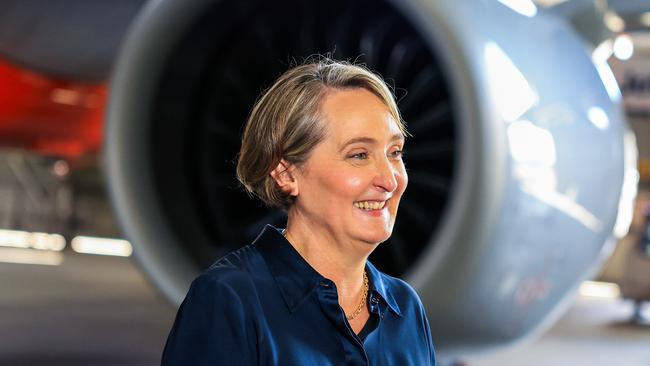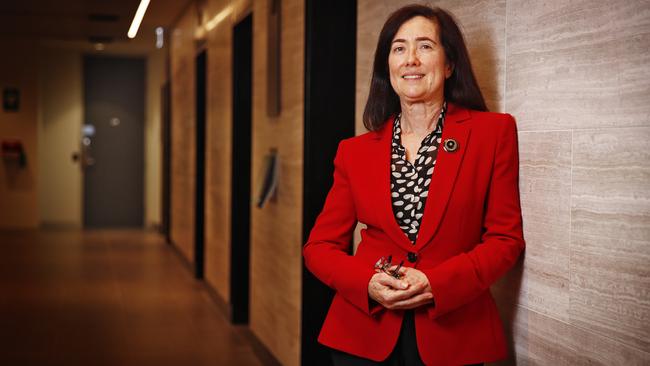Qantas strikes $120m deal with ACCC over cancelled flight ticket sales
Qantas senior managers knew the airline’s systems were incapable of informing customers quickly about cancelled flights, resulting in the years long ghost flights fiasco.

Qantas senior managers knew the airline’s systems were not capable of informing customers in a timely fashion about cancelled flights, resulting in the sale of tickets on flights that did not exist.
Australian Competition and Consumer Commission chair Gina Cass-Gottlieb revealed Qantas made the admission on the way to striking a $120m settlement deal in the ghost flights fiasco.
Ms Cass-Gottlieb who had been seeking a penalty in excess of $250m, said the settlement reached was effectively a “discount” for Qantas’ cooperation and admission of guilt.
“We do have agreement from Qantas that they admit contravention in terms of making false and misleading representations to customers,” she said.
“We are satisfied that with the factual admissions Qantas has agreed to in relation to the conduct that surrounded and the awareness of a number of senior managers that their systems were not able to give those prompt notifications to consumers, that there are multiple contraventions and misrepresentations to a large number of customers.”
Qantas said while some senior managers were aware there were deficiencies in different aspects of the systems and processes they were responsible for, the ACCC agreed that no one person was aware of all of these matters.
The airline’s CEO Vanessa Hudson conceded customers had been misled but pointed out the ACCC had dropped its claim that the airline took payment for no service, saying all of those affected were put on new flights or given a refund.
She confirmed the airline had agreed to pay a $100m fine, and distribute $20m among the 86,597 customers impacted by way of compensation for the delay in notifying them of flight cancellations.
The compensation would amount to $225 each for customers who had booked domestic or trans-Tasman flights, and $450 for international flights that were cancelled.
“Our message for customers today is that we have listened, we are acting to earn back their trust and we are accountable for mistakes we’ve made in the past,” Ms Hudson said.
Ms Hudson also apologised to employees who were focussed on the “right outcomes” for customers but did not have the right systems in place to immediately halt flight bookings on cancelled flights.
“The way our teams acted in that period of time was in the best interests of the customers — to give them the information about alternative flights at the same time as it was communicated that flights were cancelled,” said Ms Hudson.
“We have changed the systems to ensure our people are not in that situation again.”
In some instances customers were not told for 60 days after booking that their flight had been cancelled, and on average customers were not informed for 11 days after cancellation.
From now on, Qantas would be required to notify customers of a flight cancellation no more than 48 hours after the cancellation was made, and stop selling tickets within 24 hours of the decision to cancel.
Ms Hudson said the deal struck with the ACCC represented another important step towards restoring confidence in Qantas.
“We’ve always maintained that there has been a damage to our reputation and making the settlement today is a very important part in the step to regain trust and to rebuild reputation,” she said.

The $120m cost to Qantas would be recognised as an expense in the group’s annual results outside of underlying profit before tax.
The cash flow impact would not occur till the 2025 financial year.
Consumer advocacy group Choice said compensation for cancelled flights should be the norm in Australia given the level of disruption caused.
“Consumers should not need regulator action to receive compensation when it’s owed,” said Choice campaigns director Rosie Thomas.
“Choice’s 2023 survey of almost 9000 people found that of those who pursued a refund or compensation for a cancelled flight, one in five had to wait over six months.”
The compensation process would begin in earnest next month, when Qantas would begin making contact with the 86,597 customers concerned.
The booking period in question extended from May 21, 2021 to August 26, 2023, with the cancelled flights occurring between May 1, 2022 and May 10, 2024.
Ms Hudson said they hoped to reach all involved by July 10, after which time Deloitte would undertake the process of making payments.
The ACCC had not received complaints of a similar nature involving other airlines, said Ms Cass-Gottlieb.





To join the conversation, please log in. Don't have an account? Register
Join the conversation, you are commenting as Logout